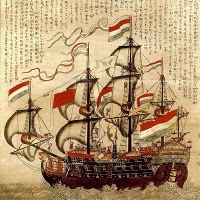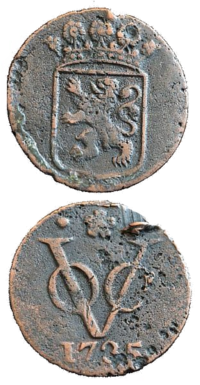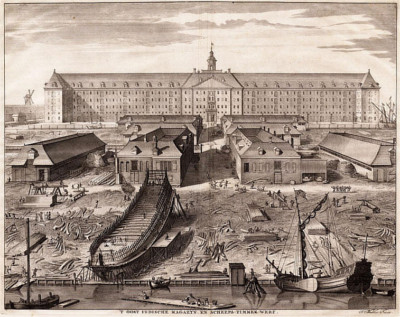
What was the Dutch East India Company? What was this network that wove its way throughout history, had a hand in almost all 18th century wars, and passed seemingly unnoticed by all?
Origins
The Dutch East India Company was a charter trading company established in 1602. It is considered to be the first ever multinational company. It was a huge organization, with a foothold in almost every country, employing more than 200 ships and several thousand men. The Company was notorious for their power plays and harsh dealings.
In 1602 the Portuguese had the largest trade in the seas and, due to a political conflict, they cut off all trade with the Dutch. Soon after, the Portuguese began to have trouble supplying as much product as was needed, causing prices to skyrocket. During this time, Portugal became a good target for the Spanish government to attack. As the Portuguese fell into war, their trade fell, and the Dutch saw enormous opportunity to move in and take over their trade routes.

Public domain image
In the 1600’s, trading “companies” were nonexistent. Trading was an individual event at the time of each voyage. The goods brought home would be liquidated on the ship’s return.
These trips were risky to invest in because so many things could go wrong: piracy, shipwreck, disease, or any number of other things. When the Dutch took over, however, they founded an actual shipping company on a much larger scale than anything ever seen before. They purchased ships, signed contracts for long term captains and commodores, and searched for merchants to do their bidding.
The East Indies were more than happy to do business with them because it meant a good deal of money for their government. This Dutch East India Company was the beginning of something massive.
The British East India Company
Soon after, the British saw what the Dutch were doing and immediately recognized the profit to be made. Queen Elizabeth sent a letter to the Dutch government asking to get in on this deal. Another branch, the British East India Company, was created.
Monopoly

After joining with the British, the fledgling company decided that they didn’t want any competition and set out to destroy other trading groups. Since they had rapidly grown to be the largest trade on the sea, this was not hard to do.
They went to various governments with the proposition of handling their trade, and threatened them against doing business with anyone else, at the risk of the Vereenigde Oost-Indische Compagnie (or VOC, Dutch for Dutch East India Company] no longer working with them.
It didn’t take much to get a complete monopoly over sea trade. At this point, the VOC completely controlled all supplies in and out of every continent.
Rogue Nation
This much power needed protection, so they began to create their own private army. Living most of their lives on the sea, they realized they did not have to adhere to the laws of any land.
They built their army in all different parts of the world, so they were highly trained in many different fighting styles. They had only the finest war ships built and had their military accompany all their trading voyages to fight off pirates and anything else that might slow them down.
Next they built their own government. They appointed members of the company as their own committee of advisors to make decisions for the company.
Taking Over The World

As time went on their lust for power and money grew. Under the guise of a simple trading company, their empire on the sea went virtually unnoticed as a threat, so no one ever tried to stop them. They got involved in more than one battle, helped shape governments, had a hand in building Cambridge University, and helped create more than one nation, including America, while supposedly working for the British.
How’s that for double dealing?
During their trading, they employed many private tradesmen as well. If any of them double-crossed them, or was even suspected of stealing, the Dutch East India Company was notorious for inflicting unspeakable tortures. They did not quit until they had everything back they had lost, then killed them.
If any country thought about stopping business with them, supplies to that country would cease. Likewise, if anyone tried to open a private trade, the VOC would either prevent everyone from doing business with them via blackmail and threats, or (they were only suspected of doing this) would act as pirates and vandalize their ships and destroy the goods.
As they travelled around the world getting richer and more powerful, they had private spies that were employed to collect damaging information about various countries’ leaders. The VOC would then simply sit on it if they needed leverage later.
They laced themselves throughout all the major wars of their time, masquerading as an innocent trading company, passing unnoticed by all as they spun their web of information, power, and money.
Decline
The VOC was in business from 1602 to some point in the early 1800s. In 1796, they began to collect debt and the Dutch government, who had been backing them before, could not pay it off. They finally went bankrupt in 1800, and the Dutch government collected all of the excess debt they left behind.
There has never been a trade empire like the Dutch East India Company since. Some countries, such as South Africa, are still struggling to rid themselves of the violent, cruel legacy they left behind.


